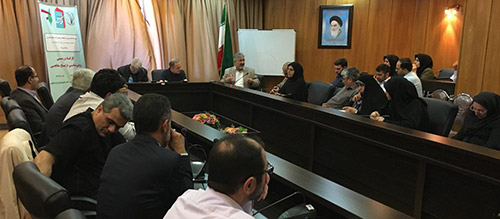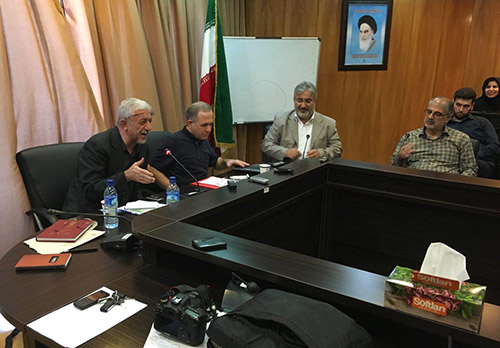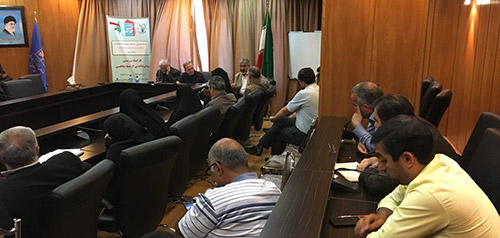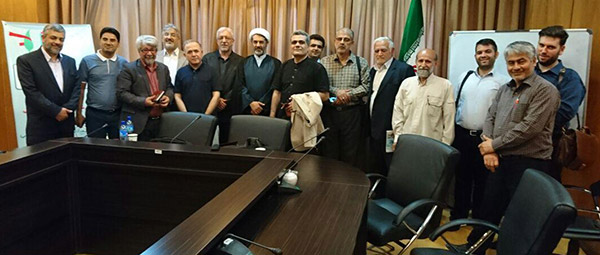Methodology in Oral History
Oral History productions are not born since the beginning of history
Maryam Rajabi
Translated by: M. B. Khoshnevisan
2017-7-18
According to the website of Iranian Oral History, the workshop “The Reviewing of Oral History Methodology” was held in Dr. Parham’s Hall of the National Library of Archives of Islamic Republic of Iran on Tuesday 4th of July 2017. It was organized by the Secretariat of the Seventeenth Round of Selecting the Best Sacred Defense Book with the cooperation of the Archives Research Center of the National Library and Archives of Islamic Republic of Iran. In the meeting, Mohsen Kazemi, a history writer and researcher was an expert and presenter, and Dr. Morteza Nouraee, the history professor of Isfahan University was the main speaker. Also a number of writers and authorities in the area of sacred defense and guests from the Foreign Ministry, the Foundation for Preservation and Dissemination of Scared Defense Values, the Oral History Association and so on were present at the meeting.
Oral History is the history of future
Dr. Nouraee said in the workshop ““The Reviewing of Oral History Methodology”, “Oral history is a booming phenomenon which includes three periods of the scientific life; the first period is the collection of information, the second one is the reconstruction of the events according to the information and the third period is the collection of information around the circumstances of events. Today we are in an international period that the event itself is not important for an oral historian. It is the circumstances of an event which defines it. We cannot use a research method defined twenty years ago for a history which is alive and called as the future history. We cannot stand on a methodology phenomenon brought up in 2004, making it as our model of research.

What made me ponder upon methodology in oral history once again was that we have many students in the recent five years who are working on oral history, sending articles for research-scientific journals almost all of which are rejected. The reason for this is that those who judge do not have a model for judging oral history and consider only the judging model of their own major. My latest student research and proposal was with a student who was working on the oral history of Islamic Revolution in Isfahan’s schools. When he gave the project, they objected to it from the beginning to the end. I had to give them a firm response and tell the professor, “It is correct that you are a historian, but this is not the reason that you have also the ability to work in the field of oral history. What you say about the theories of oral history is a mistake from the very beginning because we have no theory in oral history. If a theory is brought up while researching oral history, it will be the blind spot of the research, because a theory consists of a temporary guess and assumption which determines the path of research while the oral history research revolves around a question not a theory!”
Research in the field of oral history revolves around a subject or an individual. It is through considering these theories that our researches move toward memory-writing. It is in this way that ninety percent of oral history researches turn into oral memories necessarily while the easiest way is to hear what we like and form the memoirs of the people on the basis of our own demands and then release them! There is only one factor in collective experience while regularity must exist in history. The question system of our questions should push the researcher and interviewee toward the collective experience. For instance, if we ask someone about the history of the war or the sacred defense, we should help him or her through photos, the geography of that place and …This is in fact a shift from personal experience to collective one which should consist of different individuals. Thus, if there is a theory, it pushes us toward memory-writing unconsciously. Memory is one of the principles of oral history. We help the interviewee to reach to an intellectual birth and read himself. This reading may happen many times and is not analogous. Today, oral history research is given to a sociologist, historian and others to be reviewed and although these individuals have merits in their status, the individual should know that oral history is among added histories like the history of women, economic history, and social history. Added histories are interdisciplinary. We cannot judge about oral history or research on the basis of our historical knowledge. If we do so, what is produced is not oral history but history. We had lessons such as philosophy of history for which if a professor of philosophy came, he or she only taught philosophy and if a professor of history came, history was only taught. Other lessons such as historical sociology or historical geography had also such problems while the basis for interdisciplinary research is that the science between the two majors has reached to a level of blockage. When it reaches to blockage, it is collected inevitably and a new method is created. The result of these two sciences has created a new process and method which is neither this nor that. If we in our research do not work on the two sciences and know that oral history is none of the two sciences, in fact we have become an oral historian, because it is among the added sciences. It demands its own special method and that is not the stationary method.

The second point is that our student had been asked what your sources were. Its answer is one word; sources in oral history use snowball system. I had a research about the nursing of the war from a nursing student. We wanted to research on those who had BA degrees and went to the front and started nursing in the first, second and third lines. At present, Australia is the pioneer of nursing in war, because it believes that a force who is brought to the front with different tricks should not retreat when he or she is injured with a shot. He or she should be reconstructed immediately and preserved in the front. This process of being injured and restoration is the biggest concern of those who manage a war because it is very difficult to collect forces for any operation. We in our research knew only three persons who had gone to the front with a university degree. We started with the three at first and then the three persons gradually introduced different persons that we did not know. This research system in which you start from one or two persons and later you reach to a level of saturation is called snowball system. A student was asked sources; if he or she knows the whole data from the beginning of a research and proposal, in fact his or her research has come to an end. The motto of an oral historian is “Just do it” which has different categories ranging from the most simple to the most complicated one. I wrote a sentence from the book “al-Taji Fi Akhbar al-Dowla al-Dailamiyah” that Abu Is’haq Ebrahim Ibn-e Helal Sabbi was asked: What are you doing? He answered: There are void things that I am twisting them together and there are false things about which I am writing. This Helal Sabbi’s sentence since the fourth century till now shows many things written by the historians are in exchange for the money they receive! is not correct so much! Our concern for oral historians who are writing now is that when they are supposed to be documented 50 or a hundred years later, and history is written according to these oral history documentations, we leave the current national treasure for the future and at that time, an educated person may say ninety percent of oral history works produced till 2017 are governmental and systematic and in fact have been written due to special reasons. A historian is under the magnifying glass of the historians who are judging him or her. We must not destroy our national treasure because we need the future’s judgment. Our whole pressure on history is that every system which has the past will have the future too. So, it is better for this past to be objective and we as historians do not build a past like mirage.
The point that made me to do research on methodology is in fact called reverse methodology. Reverse methodology means if we face an obstacle, we must do pathology, and this pathology leads us to better ways and methods. The added histories have grown significantly since almost the second half of the twentieth century and we may have 24 or 25 forms of history. Our concern is that we are facing with a pile of productions that if they are analyzed, at least ten grams of gold are found in them; a reason for this is that the history itself has been faced with an impasse and when it is faced with an impasse, it should be mixed with sociology, the science of politics and economic studies and resort to give birth to be able to respond to the posterity, when the sciences reach to a blockage, they are looking for a way and loophole, moving toward becoming an interdisciplinary.”

Nouraee continued, “Every added history has been researched and found its own method. Fortunately, there is a book which has recognized some 15 cases of added histories on the basis of methodology. We also found out in our research that oral history has its own method. The method of snowball is used in collection of information, but it is analyzed in the system of grand theory. But time is the body of a historic research and oral documentations are brought to be strengthened. For instance, you are writing about the contemporary history of a city about which there are books and documents, but interview about some blind points. This body is worked on the basis of the common method of history, but some time our research is totally based on oral history. We have our own methods regarding the oral history of nursing of the war which the Nursing College of Isfahan University offered to us and show where to use an interview and how to analyze the obtained matters.”
Interactive nature of oral history
In continuation of the workshop “The Reviewing of Oral History Methodology”, Nouraee said, “In my previous experiences, I have always said – and I don’t know now whether I can stand on this point – that oral history has an interactive and dependent nature. For instance, we know that tree is a phenomenon with high stature which has foliage. Among the trees, the vine is a tree rolling on other tress. It is not substantive, using other phenomena continuously, and for this reason, it is attracted in all aspects of the society. In the United States, one of the efficient methods for producing a work for historians and for keeping the society's experience in mirror mood is to employ historians in all the institutions. We need historians in every economic, social, political and military system in order to remind all their experiences continually.
He added, "Information is collected in the first period of oral history, events are reconstructed based on this information in the second period, and the third period is when the circumstances of an event are going to be reviewed, any occurrence is one aspect of an incident which is registered and the individuals who are in this event, explains the reasons and quiddity. Here, the original operation is not important, but it is the principles of psychology which is important. We may be under the influence of a series of currents and interpret an event. That is why it is said since the basis for oral history revolves around questions, and asking questions deals with exploring the psychology, it is a qualitative research and for turning it into a quantity, we resort to research. Regarding an operation, marriage, prison etc. we have to ask questions from many people; the historians generally say some 70 to 120 people meet the requirements which can also increase to 5000, like the research about the Victoria era. We are facing with vey vast information in this phase and have to turn the people who have carried their own personal reading into keywords. The keywords which become similar and analogous and we should level them in order to reach the key heads and original codes. When we reach to original codes, in fact, we are turning the qualitative discussion into quantitative one in order to be considerable and tangible for the society. This process depends on the interviewer how to ask and to what extent the questions are distributed and how they are posed for which a single answer cannot be said, and this depends on the subject about which is researched. Many people are of the view that in oral history, we need questions on the basis of a subject."

Our weak point is that we do not have oral history archive
In response to the question of Mohsen Kazemi regarding the qualitative transference of oral history information into quantitative one, Nouraee said, "The weak point of Iran is in oral history archive. We have no available archive. We produce a phenomenon and refer to it, but those references are not available. When a person carries out an oral history project, in fact, he or she has read himself or herself. Now we want to give the same content of the archive to another historian to read; thus, this quality is turned into quantity by the mind of someone else. Therefore, the oral historians insist that we must have national archives in public level; disposable interviews cost a lot. The interviews should be in a way that someone can see the documentations at any time and resort to production. Another point is that the oral history productions are not born from the beginning of history, not documents! Documents are in a way that anyone can read them at any time and interpret anything he or she likes. It is history not document, so we say "Oral evidences" not oral sources! In fact, an interview is produced when it has been read itself. When a person defines himself or herself and is interviewed, he or she had made a qualitative production. We put this qualitative production on public experience and social analysis, collecting it gradually, and making it in the shape of the codes which turn into quantitative symbols and this means that we make a concept for it."
Objectivism in oral history
In continuation, Kazemi said, "A sociologist or an anthropologist goes to the society, carrying out their research, they have a clear statistical society and moves toward it and then tries to generalize the obtained results. The data of this statistical society – which is carried out through questionnaires or other works – has more stability than what is happening in oral history and it is not possible that a sociologist pays attention to oral history data."
Nouraee answered, "The oral history period is not at present and a sociologist can go and reconstruct his or her own phenomenon. Oral history is 180 years old namely it is more than three generations and in fact every three people from every generation can define a phenomenon. It is not the experience of a person necessarily and can hear it from someone else. These are the points in oral history which distance it form the objectivity of sociology. The difference between the historical objectivity with other sciences is that the historical objectivity can be proves and accepted and needs sequence. But in other sciences, it may be said that this is a papers and others go and see it very easily. Another point in oral history is that a collection of work which is carried out is considered as a consultation and does not specify anything. In fact, it offers to the statesmen and economists, introducing a collection of information and data which can be very useful and pathfinder. This in fact is called objectivism in oral history or the history of diplomacy."
The most influential definition for oral history
He added, "If I want to mention a definition for oral history, I can cite the sentence of Professor E. H. Carr who shocked the principles of historiography and historicism with this sentence: "History is an unending dialogue between the past and present." This dialogue can be oral or written. It has been said that the most influential definition in historiography of the twentieth century and the beginning of the twenty first century is the Dr. Carr's definition. The dialogue of the past and present happens in the context which is multilateral, because the writer has intercommunicated with the context and the book with the past and then talks with the reader thought his or her writings. On the other hand, oral history is not substantive, because in some events and incidents, it has been collected exclusively by the witnesses who have been involved in that event, and there is no other evidence. On the other hand, we should have oral historian in all fields and the history must move in an organism form. At present, this is one of the weak pint of our oral historians. The country's officials and authorities must distribute oral history across the country."
Number of Visits: 4984








The latest
- A Critical Look at Pioneers of the Valley of Light
- The Artillery of the Islamic Revolutionary Guard Corps
- Translation in Oral History and Its Potential Pitfalls
- 100 Questions/14
- Third Regiment: Memoirs of an Iraqi Prisoner of War Doctor – 14
- Analysis and classification of oral literature of resistance using emerging technologies
- 100 Questions/13
- Preface and Introduction in Oral History Books
Most visited
- Translation in Oral History and Its Potential Pitfalls
- Oral History of 40 Years
- Analysis and classification of oral literature of resistance using emerging technologies
- Third Regiment: Memoirs of an Iraqi Prisoner of War Doctor – 13
- The Artillery of the Islamic Revolutionary Guard Corps
- 100 Questions/13
- Preface and Introduction in Oral History Books
- Third Regiment: Memoirs of an Iraqi Prisoner of War Doctor – 14
100 Questions/8
We asked several researchers and activists in the field of oral history to express their views on oral history questions. The names of each participant are listed at the beginning of their answers, and the text of all answers will be published on this portal by the end of the week. The goal of this project is to open new doors to an issue and promote scientific discussions in the field of oral history.The Role of Objects in Oral Narrative
Philosophers refer to anything that exists—or possesses the potential to exist—as an object. This concept may manifest in material forms, abstract notions, and even human emotions and lived experiences. In other words, an object encompasses a vast spectrum of beings and phenomena, each endowed with particular attributes and characteristics, and apprehensible in diverse modalities.100 Questions/6
We asked several researchers and activists in the field of oral history to express their views on oral history questions. The names of each participant are listed at the beginning of their answers, and the text of all answers will be published on this portal by the end of the week. The goal of this project is to open new doors to an issue and promote scientific discussions in the field of oral history.The Importance of Pre-Publication Critique of Oral History Works
According to the Oral History website, a meeting for critique and review of the book “Oral History: Essence and Method” was held on Monday morning, November 10, 2025, with the attendance of the book’s author, Hamid Qazvini, and the critics Mohammad Qasemipour and Yahya Niazi, at the Ghasr-e Shirin Hall of the National Museum of the Islamic Revolution and Sacred Defense.

